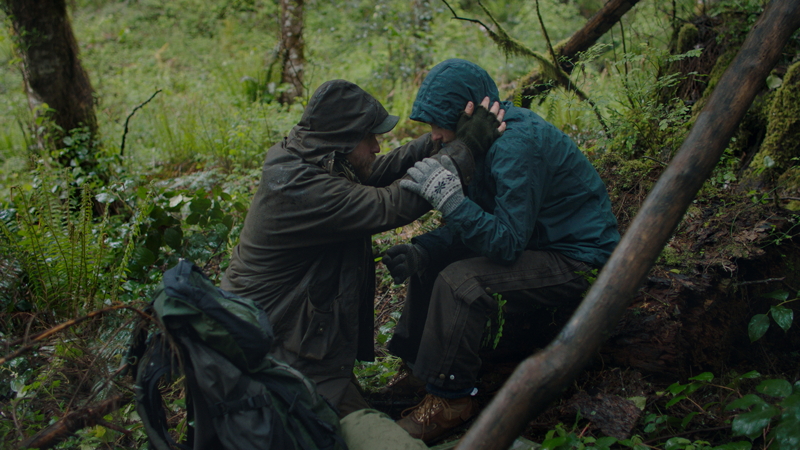
************************This review contains spoilers****************************
“How important are their judgments?”
“I guess I’ll find out.”
In Leave No Trace, Ben Foster portrays Will, a father and Marine veteran struggling with post-traumatic stress disorder. Along with his daughter Tom (Thomasin McKenzie), Will lives an isolated existence in Forest Park, a vast public park near Portland, Oregon, rarely venturing out into the larger world. When the small family is eventually found by park rangers and social workers, they struggle to find a home that satisfies Will’s need for isolation to hide from his post-war demons, and Tom’s desire to venture out further into the glimpses of freedom their discovery have given her.
Through its main characters, Leave No Trace is a study in the frailty of trust; how integral it is in human interaction, and how easily it can be permanently lost in the absence of great care. The struggles that Will has in integrating back into society following his experiences as a soldier represent a betrayal of the trust that he put into his government and country at large after volunteering his services and returning home traumatized and in need of help. The mental health of soldiers returning from combat, their need for care, and the unfortunate concurrent problem of the functionality of the Department of Veterans Affairs is all too familiar to those who read the daily news. The lack of trust in government institutions to live up to the promises they’ve made to those who have sacrificed much on their behalf has led veterans around the country to extreme lengths to cope or make their voices heard. Will is a fictional examination of the trauma that leaves America’s veterans feeling as if they have no to turn to for help except for themselves. Will has come to distrust the outside world after his battalion suffers from multiple suicides without being offered much to stem the post-war tragedies. In response, he turns inward, completely shunning society and instead seeking refuge on his own in the wilderness, where he can fend for himself and live outside of the constraints of an environment he no longer trusts.
Tom’s journey through out the film serves as the antithesis of Will’s broken trust in humanity. For Tom, her introduction to the larger world represents a life full of new experiences and the opportunity to branch out and obtain something greater. Upon their initially being discovered and placed in temporary housing through Oregon state social workers, Tom is given the chance to go to school and meet other young teens with interests similar to the ones nurtured through her survivalist upbringing with her father. In addition, after her father suffers a severe injury while headed to bring them supplies, he and Tom are helped by good Samaritans who live a slightly similar rural existence while asking for nothing in return. In Tom’s experience, every time she has put her faith or trust in someone from the outside world, it has been rewarded. This positive reinforcement is the opposite experience of what Will has experienced, leading her to the opposite conclusion that joining the outside world wouldn’t be so bad after all.
Throughout the film, director Debra Granik brilliantly displays the importance of trust by drawing a parallel between human-animal interaction and human-to-human contact. Tom comes into contact with various animals during the course of the Leave No Trace, from a neighbor’s rabbit, to the dog of a trucker she and her father meet while hitchhiking, to the service dog of a veteran living in the trailer park she and her father eventually settle near. In all of these cases the bond Tom forms with the animal, where it immediately trusts her in its presence and lets her get close with it, leads to a bonding and trust with the animal’s keeper, allowing Tom and that person to trust one another and giving Tom a perspective on human interaction and cooperation outside of her father’s. This is made most plain in Tom’s friendship with a beekeeper in the trailer community, who explains to her that while the bees are capable of killing her if they chose, her ability to gain their trust, and as a result access to her community, was paramount and an achievement she was proud of reaching. The beekeeper-beehive relationship serves as a metaphor for community and the struggling at the center of the film. Our society has lost Will’s sense of trust, rendering him unable to allow our community access to him, instead opting for a life of solitude. Tom on the other hand is able to build a sense of goodwill with the people and communities she encounters after being discovered, leading her to making the choice to integrate into a community rather than return to the wilderness like her father.
Leave No Trace is a film that uses the portrait of a close father-daughter relationship to examine human interaction and critique a social issue and its fallout that America will be dealing with for the foreseeable future. Ben Foster and Thomasin McKenzie display dazzling chemistry as a father and daughter forced to rely on each other for survival and comfort with a deep abiding love for one another. Foster continues to build his reputation as a transformative actor with McKenzie instantly marking herself as a young thespian to watch. Debra Granik shows that her breakthrough film 2010’s Winter’s Bone was no fluke, again beautifully portraying the American wilderness and bringing strong, young female characters to the screen in examinations of families struggling to hold onto each other under trying circumstances. Leave No Trace is undoubtedly one of the year’s best films, a display of acting and directorial talent that takes true to life circumstances and issues and presents them as real as can be made possible through a fictional tale.
Image: Bleecker Street

